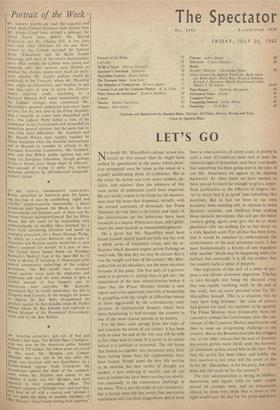—Portrait of the Week— MR. HAROLD MACMILLAN read the auguries
and acted. Seven Cabinet Ministers went, among them Mr. Selwyn Lloyd (who refused a peerage), Sir David Eccles (who didn't), Mr. Harold Watkinson and Dr. Charles Hill. A few days later nine other Ministers felt the axe. New- comers to the Cabinet included Sir Edward Boyle (Education) and Sir Keith Joseph (Housing), and most of the eleven backbenchers given office outside the Cabinet were young and reputedly able. But opinions were divided on whether the changes meant very much (in parti- cular whether Mr. Lloyd's policies would be continued at the Treasury, where Mr. Maudling now reigns as Chancellor), and whether in any case they came in time to renew the Govern- ment's electoral credit. According to a National Opinion Poll taken immediately after the Cabinet changes were announced, Mr. Macmillan's personal popularity had never been so low: for the first time in his Prime Minister- ship a majority of voters were dissatisfied with him. The Labour Party tabled a vote of no confidence in the Government and demanded an immediate general election; but the party had its own little local difficulties: Mr. Gaitskell and Mr. Harold Wilson were roughly handled by fellow Socialists when the Socialist International met in Brussels to consider its attitude to the European Economic Community. Mr. Gaitskell, who said that British public opinion was not ready for European federation, 'though perhaps in ten or twenty years things might be different,' was accused of trying to settle 'big modern economic problems by old-fashioned nineteenth- century cliches_'
AT THE GENEVA DISARMAMENT CONFERENCE
Russia welcomed an American plan for lessen- ing the risk of war by establishing 'rapid and reliable'. communications (presumably a direct telephone link) between the Heads of the two Governments and between each of them and the United Nations Secretary-General. But the White House did not seem to be responding very enthusiastically to another idea, invented by a New York advertising executive and based on medizeval precedent, for a Peace Hostage Pledge, by which, as a nuclear deterrent, top people of American and Russian society would live in each other's countries for periods of a year or two. The United States Senate threw out President Kennedy's Medical Care of the Aged Bill by 52 votes to 48 (the 52 including 21 Democrats) after several compromise redraftings of the original provisions. The Bill would have increased social security taxes paid by employers and employees and used the extra money to give a limited amount of free hospital care to Americans over sixty-five. Mr. Kennedy announced that he would reintroduce the bill in Congress next January. In the struggle for power. IR Algeria M. Ben Bella strengthened his Position against M. Ben Khedda when M. Ferhat Abbas, whom M. Ben Khedda had replaced as Prime Minister of the Provisional Government, went over to the Ben Bellists.
SIR WINSTON CHURCHILL got out of bed and walked a few steps. The British Open Champion- ship was won by the American golfer Arnold Palmer in 276 strokes, the lowest score on record in this event. Mr. Marples, one Cabinet Minister who was still in his seat after the Purge, was involved with two Guardsmen on a Euston-bound express from Liverpool; the Guardsmen opened the door of the compart- ment where the Minister was asleep to see whether it really was Mr. Marples, and were reported to their commanding officer. The assistant adjutant at Pirbright later said that they 11. ad been let off with a caution and 'advised it 's not quite the thing to awaken members of Her Majesty's Government during train journeys.'


































 Previous page
Previous page